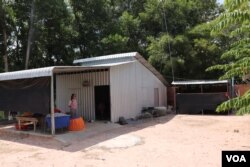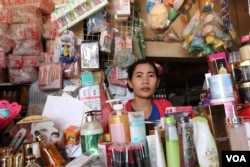In Rotha passed the national exam for high school graduates in 2011. At the time, her ailing, widowed mother could not pay for college so In Rotha found work in a garment factory to support her mother, a sister and a brother. Her starting salary was $61 a month.
Since then, like the more than 750,000 workers in the sector in Cambodia, she’s benefited from the annual wage increases fought for by labor rights activists, one of whom is her husband Mut Mao, 37, a union leader.
Today, she earns $182 a month after five years working in the Tak Fook factory in Kampong Tralach’s Thmar Ith commune, which employs about 5,000 workers, producing garment for H&M, Swedish multinational clothing-retail company known for selling fast-fashion, and Canadian brand Carter’s, known for comfy children’s clothing.
But now In Rotha and her husband feel powerless. As the European Union mulls revoking Cambodia’s preferential trade arrangement under the Everything But Arms (EBA) scheme, workers like them sense their livelihoods may be at risk.
Should Cambodia lose its duty-free access to the EU market, brands may look elsewhere for factories to make their garments, potentially causing thousands of job losses, say those following the industry in the region.
Making matters worse for many garment workers is that if they lose their jobs, they will be unable to repay microfinance institutions which have loaned them money for such needs as medical treatments, weddings, family farm expenses and funeral costs. Cambodia has “the world’s highest average MFI loan,” according to one Cambodian NGO.
A year ago, In Rotha and Mut Mao borrowed $10,000 from Kredit microfinance to buy a plot of land, hire workers to clear it and buy additional dirt to level her land.
The couple must repay decreasing monthly payments ---$270 to $230---over the next three years.
Right now, they’re OK. In Rotha makes at least $190 per month working in the factory’s maintenance section while her husband makes around $300 per month working in the repairs section. That leaves them about $250 a month with unpredictable overtime for living expenses - not bad in a country where the average per capita income in December 2018 was $1,599, according to ceicdata.com.
But take their incomes away and they face disaster, In Rotha said. She estimates her family expenses are about $500 per month including the loan repayment.
“I spend $100 on milk per month [for our baby girl], [I] give my mother $50 and the school fee [for my daughter] and her expenses are $50,” In Rotha told VOA.
Because overtime varies, In Rotha said that she and her husband regularly eat less and forego meat to save money to repay the MFI.
“I buy food for dinner, cook it, and I save some for breakfast,” she said, adding the meal might be just eggs and vegetables.
As a developing country, Cambodia qualifies for the EU’s EBA scheme which permits duty-free export of all products except for weapons and ammunition to the EU.
On February 12, the EU began an investigation into the possibility of revoking the trade preference. The bloc was concerned that Cambodia’s government had violated the agreement when it dissolved the main opposition party Cambodia National Rescue Party in 2017 and launched a crackdown on civil society organizations and the media that continues.
Advocates for human rights for Cambodians, during the past two years, consistently have criticized authorities for sustaining a culture of repressed political, press and speech freedoms.
The EU finished the investigation on August 12. The findings will be compiled and sent to the Cambodia government in November, officials have said.
On October 13, Prime Minister Hun Sen began a five-day visit to Europe to drum up support for Cambodia’s continued EBA status. He returned with the backing of Bulgaria, Hungary and Czechoslovakia, according to local news reports.
If the EU cancels the scheme, the economic impact could be devastating. The government released a revised projection in August that shows that the country's GDP growth will fall to 6.5% from 7.1% because of the possible EBA cancelation.
The government has projected that the growth in the garment and footwear sector would drop from 7.1% to 3.5% in 2020.
“What is at stake are the jobs of hundreds of thousands of workers and the livelihood of their families as direct beneficiaries of the economic growth, higher wages and social benefits that have been enabled thanks to EBA,” Arnaud Darc, chairman and CEO of European Chamber of Commerce (Eurocham) in Cambodia, said in an email. Darc, who has a background in the hospitality industry, witnessed the growth in Cambodia and Thailand since 1994.
Darc said that the Cambodian government, the EU and other relevant institutions should “focus on preserving achievements and further building on it.”
“What matters most is that … workers, most of whom are women, will be at risk of losing their job and being unable to feed their families and provide education for their children if EBA is removed,” he wrote.
“By removing EBA, the EU will not only damage its influence in Cambodia but also destroy the tremendous progress that two decades of EBA have brought to the Cambodian people,” he said.
But not only factory workers face losing their income. The Garment Manufacturers Association in Cambodia (GMAC) estimates some three million people, from workers’ families to vendors and associated industries, could be affected.
“Many other industries depend on us,” said Ken Loo, GMAC secretary general.
“For example, the microfinance heavily depends on our industry because a lot of the loans are actually given out directly to the garment workers or they are given to the family members of the garment factory workers based on the knowledge that this family has one or more [children] working in a garment factory with a stable income.”
Milford Batement, freelance consultant on local economic development policy who has written several books about microfinance, said that if Cambodia loses the EBA classification, garment workers’ debt defaults would destabilize the MFI sector.
“It will seriously affect them since many jobs will be lost,” Bateman said.
“Wages are likely to go down for those remaining (now desperate to remain in a job and willing to accept a pay cut) and local communities in which they live will suffer from lower demand.”
At least 2.4 million people in Cambodia have microfinance loans, for at least $8 billion in outstanding debt, according to a report from the Cambodian League for the Promotion and Defense of Human Rights, known by its French acronym, Licadho, and Samakum Teang Tnaut.
Sot Kimleang, 33, runs a general store out of her home next to the Tak Fook factory.
Sot Kimleang borrowed about $100,000 from a bank to expand her business, which she started 10 years ago. She said that the possible collapse or reduction of the garment sector if EBA is withdrawn would be crushing. She said she has to pay the bank at least $2,000 per month.
“I have borrowed lots of money to do business; I have taken about $100,000,” she said.
If Cambodia loses EBA protection, “It will affect my business. I need income by selling my goods to garment workers. I need to pay [the bank] every month. We all will suffer.”
“I moved to live [and run a business] here because there are factories here,” Sok Kimleang explained.
In Rotha, who oversees sewing machine-needle distribution for more than 500 workers, estimates that 90 percent of her coworkers have taken loans from MFIs to spend on housing, motorbikes, health-care and other expenses.
“When they come to have the needle changed at my section, they share their concerns with me and I share mine with them,” In Rotha said.
Yang Sophorn, president of the Cambodian Alliance of Trade Unions, started in the garment industry in late 1990s, when the minimum wage was $30 per month. She wants the government to find a way to maintain Cambodia’s EBA status.
“We do not want to lose trade preference,” Yang Sophorn told VOA Khmer.
“If we lose trade preference it will affect almost all workers’ economy. Not only that, it will also affect their family members, because they are responsible for the members.”
Asked what she could do to help her fellow garment workers, Yang Sophorn said that the government has the key to the answer.
“It’s beyond my capacity,” she said.
“If we lose EBA completely, our workers won’t go back to farming,” she said. “I think most workers will decide to leave the country to find work in neighboring countries.”
In Rotha, the garment factory worker, fears that she could face losing the family house if her income drops. She said migrating to work in another country may be her only choice.
“I am worried that the bank will confiscate my house,” In Rotha said.








